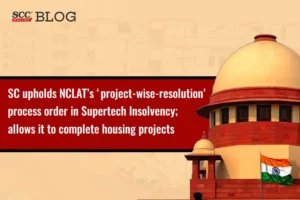Supreme Court: In a batch of appeals filed by Union Bank of India and Indiabulls Asset Reconstruction Company Ltd. (appellants) against the order of the National Company Law Appellate Tribunal, Principal Bench (‘NCLAT’), wherein, while admitting an application under Section 7 of the Insolvency and Bankruptcy Code, 2016, (‘IBC’) a slew of directions were issued which converted the Corporate Insolvency Resolution Process (‘CIRP’) into a “project-wise insolvency resolution process”. The Division Bench of Dinesh Maheshwari and Sanjay Kumar, JJ., upheld the NCLAT’s order for ‘project-wise resolution’, and said that if Committee of Creditors would be constituted for Supertech Ltd. (‘Corporate Debtor’) as whole it would cause hardships for home buyers.
Background
The appellants are the financial creditors of the corporate debtor. The corporate debtor is a real estate company engaged in construction of various projects, which received credit facilities from Union Bank of India in the sum of Rs. 150 crores, for the development of the Eco Village-II Project. Subsequently, Union Bank of India and Bank of Baroda entered into an agreement, extending second credit facilities in the sum of Rs. 200 crores, with Union Bank of India’s total exposure being Rs. 100 crores.
On corporate debtor’s default on the loan repayment, the account was declared as a ‘Non-Performing Asset. Thereby, the Union Bank of India filed an application under Section 7 of the IBC, claiming a total amount of Rs. 431,92,53,302/- along with accrued interest. The NCLT, admitted the Section 7 application and directed for initiation of CIRP for the corporate debtor and an Interim Resolution Professional (‘IRP’) was appointed.
Aggrieved by the order of NCLT, the promoter/suspended director of corporate debtor filed an appeal before NCLAT. The NCLAT issued interim directions for constitution of Committe of Creditors (‘CoC’) for Eco Village Project-II and only the said project to be completed with assistance of ex-management whereas other projects, apart from Eco Village-II, were ordered to be continued as ongoing projects.
Dissatisfied with the interim directions issued by the NCLAT the appellants, financial creditors of corporate debtor, filed appeals before the Court, essentially challenging the adoption of reverse CIRP by the NCLAT and limiting the CIRP and constitution of CoC to only one project of corporate debtor, i.e., Eco Village-II.
Court’s Decision
Whether the proposition of ‘project-wise resolution’ for insolvency application under Section 7 of IBC as adopted by the NCLAT was tenable?
The Court said that the NCLAT had adopted a particular course while observing that the ‘project-wise resolution’ may be started as a test to find out the success of such resolution. The result of the directions of the impugned order was that except Eco Village-II project, all other projects of the corporate debtor were to be kept as ongoing projects and the construction of all other projects was to be continued under the supervision of the IRP with the ex-management, its employees and workmen.
Further, the Court said that if at the present stage, CoC was ordered to be constituted for the corporate debtor in displacement of the directions of the NCLAT, it was likely to affect those ongoing projects and thereby cause immense hardship to the home buyers while throwing every project into a state of uncertainty. The Court also noted that on the other hand, the other projects were being continued by the IRP and efforts were being made for infusion of funds with the active assistance of the ex-management but without creating any additional right in the ex-management. Thus, the Court viewed that greater inconvenience was likely to be caused by passing any interim order of constitution of CoC in relation to the corporate debtor as a whole and it may cause irreparable injury to the home buyers.
Thus, the Court said that it was not inclined to alter the directions in the impugned order regarding the projects other than Eco Village-II. The Court refused to interfere with the directions relating to the Eco Village-II project, since CoC was ordered to be constituted by the NCLAT in the impugned order, however the Court said that any process beyond voting on the resolution plan should not be undertaken without specific orders of the Court.
[Indiabulls Asset Reconstruction Co. Ltd. v. Ram Kishore Arora, 2023 SCC OnLine SC 612, Order Dated: 11-05-2023]

